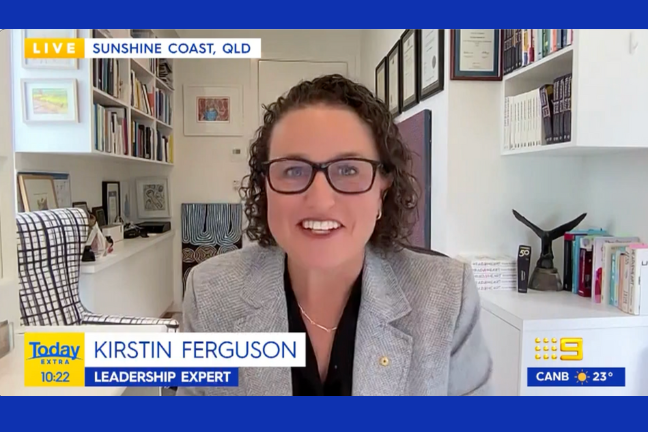
Complete the Head & Heart Leader Scale™ and receive a free, personalised report here.
Complete the Head & Heart Leader Scale™ and receive a free, personalised report here.
Meg Bolton – ABC Sunshine Coast
8 March 2023
A prominent campaigner for women in business says she was almost 40 before she became a feminist.
Kirstin Ferguson said she sat on 11 company boards and also served in the Royal Australian Air Force for almost a decade.
But for much of her career, she hoped no-one would “notice” she was female.
“You wouldn’t have caught me at a women’s lunchtime networking event at all in my 20s and 30s and that was because I feared being labelled as some kind of nuisance,” Dr Ferguson said.
“God forbid wanting to be paid the same as my male colleagues.
“I just blended in and I became one of the guys and that really set a path for me of thinking that that’s how you got on when you are in a male-dominated environment.”
Dr Ferguson rose to the top and worked on many boards including ASX200-listed companies and as acting chair of the ABC.
Census data shows on average, men earn more than $450 more a week than women.
According to the Australian Bureau of Statistics, women continue to be under-represented in leadership roles.
The latest data showed managers were twice as likely to be men than women in 2019–20.
Just 35 per cent of ASX200 board members were women as of last November.
“Once you see it, you actually can’t unsee it but I’m the first to say it took me far too long,” the author, columnist, and company director said.
“I’m definitely a slow-onset feminist.”
Nicola Scott said she was encouraged at school to learn to sew, cook, and pursue a career in administration.
But the self-proclaimed “bush kid” said she felt most at home in male-dominated industries.
Three years ago, she became the first female Sunshine Coast regional manager at Master Builders after a career in construction and corrective services.
She said opportunities were available for women to perform leadership roles in the construction industry if they were willing to work for it.
“If you work in a male-dominant industry, you probably have to work that little bit harder to show you can keep up and you’re willing to get your hands dirty,” Ms Scott said.
“Once you’ve demonstrated that you are just as capable as anybody else on the team, you have a great deal of respect.
“I absolutely hope that one day you don’t have to, but it is a conversation that I hear a lot.”
Women make up 10 per cent of construction managers, but only 1 per cent of workers on the tools, according to Census data.
After not having a lot of women to look up to, Ms Scott said she encouraged other women to join the growing number of women in construction.
“Regardless of gender, you should have the same opportunity as the person sitting next to you, regardless of who they are,” she said.
“If we are determined to make an impact and make a difference, then doors will open but we’ve got to step through them to actually embrace that opportunity.
“I’m certainly seeing that change and we’re breaking down the barriers.”
Dr Ferguson said every woman had the ability to become a leader and make cultural change by supporting others.
“It’s such a shame it took me so long because when women understand that we’re all going through the same challenges, if we band together, there’s a lot that we can achieve,” she said.
“There’s plenty of research that shows if you’re in a meeting, and a woman suggests something and then a man goes on to say the same thing a few minutes later, everyone will listen to the man saying it.
“But there’s also research that shows if another person reinforces what that woman says so it might be ‘I really agree with Sally’s point’, you can suddenly change the dynamic.”
Dr Ferguson said the United Nation’s International Women’s Day was a good reminder to strive for equality.
“Women face harassment and gender pay gaps and exclusion from golfing networking days and the more we can all call those out, the better off we’ll all be,” she said.
“It’s really simple stuff to do but it makes a difference.”




